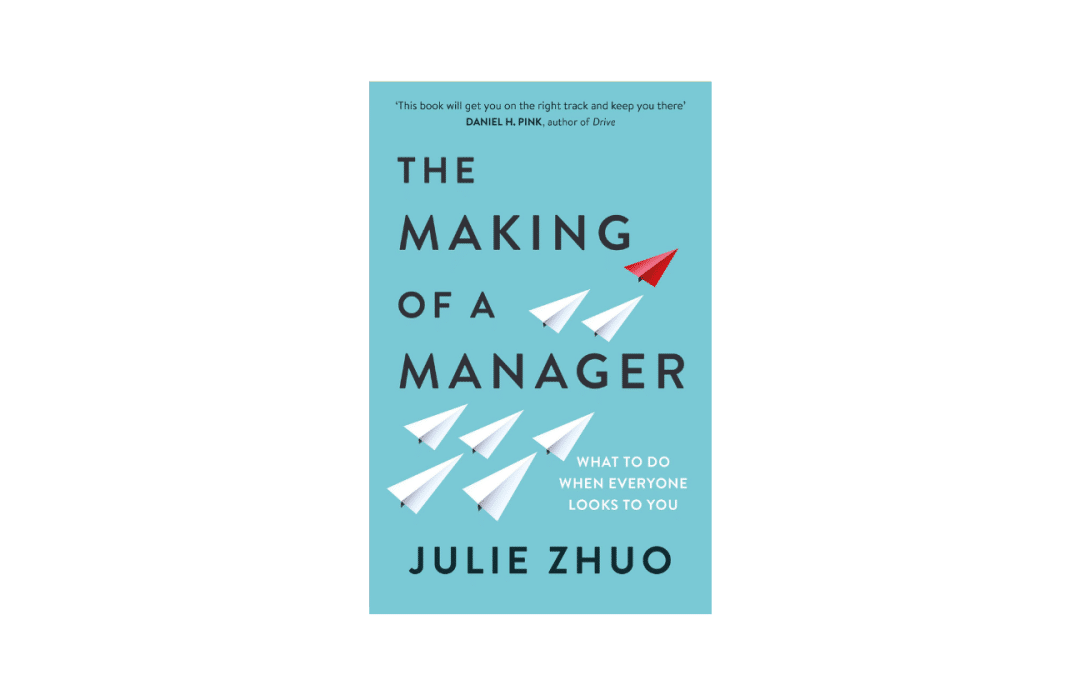The making of a manager book review
“Great managers are made, not born” These are the first words you will read of this book and let us be honest, they are quite reassuring.
When I started to read “The Making of a Manager“, I bought a digital version (yes, the K type), and I immediately realised the huge mistake I made. “The Making of a Manager” is a book to live, breath, underline and keep on your desk constantly.
Julie Zhuo became manager at the age of 25 in what is now “the company that connects people across the world: Facebook”. She shares with us all the lessons learnt and how she efficiently led teams spanning from tens to hundreds of people. This book is more a guide packed with real-life examples and insights from Julie’s life.
On a personal note, I liked the fact that managers were finally identified as “she”. Let us be honest; many managerial books out there are difficult to identify with for a woman. I have also appreciated the questions that Julie is asking herself because they are finally questions I can find myself. I am not feeling alone anymore; somebody, somewhere in the world, is feeling exactly as I do. Wow, that is refreshing!
No matter how many management courses you attend, how much you are learning from at your Business School and how much work you are doing with your HR Business Partner, managing people is hard. Yes, I said that; it sounds liberating!
So why does Julie say that managers are made and not born? Well, you have the big M in your role name now, so you think you are now a manager. Nothing more could be wrong; this is just the beginning of a long and complex journey that will teach you a lot about others, but mostly about yourself.
When we started our careers, we all thought that being a manager means meeting your reports and ensuring that things are done and figuring out whom to promote and support in case of issues. Well, Julie shares a fascinating insight with us: “a manager’s job is to:
- Build a team that works well together.
- Support members in reaching their career goals.
- Create processes to get work done smoothly and efficiently.”
The difference is all in the purpose, from managing pure day-to-day activities to provide a long-term benefit through our actions. Why is this so important? Because it focuses on the output of the team instead of the activity itself. Your sales team can make a thousand calls per day, but the focus is on that single sale (output).
If we think about all the manager’s daily activities, the author perfectly summarises the concept we should focus on:
Purpose, People and Process
Purpose: Why does our work matter?
What a powerful question to ask! Purpose-driven teams achieve much more than task-driven teams, so always ensure that you know your team’s purpose, and they know too!
People: Who
Are your team members set up to succeed, do they have the right skills, are they motivated to do a great job? This level of awareness will change the way you see your reporting team for what they can achieve. You will know your strengths and weaknesses and will use and improve them appropriately.
Process: How
How does your team work together? This is another important exercise for you to make, is your team communicating properly, is everybody working towards achieving deadlines on time? Is your team a team or just a group of people? (this is not mentioned in the book, but clearly, I am referring to the Tuckman model describing the stages of group development).
Once you understand your team, it is a good idea to understand what kind of manager you are and how to go through the challenges of your first three months in the new role.
Apprentice, Pioneer, New Boss or The Successor? What to take advantage of and what to watch out for seems to be brief reflections, but how many times would we have loved to have a friend help us figure it out? The author will guide you through the difficulties, and advantages, of managing your former peers or having to build a brand-new team in a start-up (build Culture, values, methods of working) or being the new boss and adapting to a new environment together with the challenges of building new relationships, compared to the pressure to be as good as your former manager.
“A manager’s job is to get better outcomes from a group of people working together through influencing purpose, people and process.” When leading a (small) team sharing a sense of purpose is simple; it is on people you should focus your work on. Another gift from Julie is a framework for diagnosing lacklustre work is:
Expectations –> Motivation –> Skills
Is it a matter of Expectations? Have you been explicit in identifying what good work looks like?
Motivation: is the objective of the work not attractive? Is the role in the team correct for this person?
Skills: is there a skills’ gap between performing exceptionally well, and what can you do to change this situation?
The author continues to provide remarkable insights on how to build trust, dedicate time to know your direct reports, how to show respect and care, be transparent and admit your mistakes. Although the list of things a manager must do is exceptionally long, one of my favourites is a “must not” accept, which I found very funny and infinitely true. I am talking about Stanford’s professor Robert I. Sutton who wrote The No Asshole Rule: page 73 – I would not spoil the surprise!
One of my favourite chapters is the art of feedback. How difficult is it to communicate, mostly when feedback is negative and balance the delivery of the information with the worry of offending the other person?
Another great gift from this book is the definition of what great feedback looks like, with real examples and multiple replies. Once the correct answer is revealed, an analysis of the alternatives is presented as well. It is crucial to understand why our feedback does not work and how we should have worded our phrases. Julie is asking herself the same questions I do every time:
- Is my feedback going to change things positively?
- Am I being heard?
- Will I have to do this again, and how often?
- What is the best delivery to be clear and concise?
No book would be complete if it were not teaching you how to know yourself. Your management style is the starting point of your team’s impact, and understanding how others see you is a fundamental process of your growth as a manager and individual.
Through the pages, I have been amazed by Julie’s support from peers and management in her self-awareness process. It is a reminder that we should also support our colleagues, not just our teams. When we share our challenges and grow from someone else’s experiences, we make our teams more robust, and therefore their output. A manager’s job is somehow lonely, and networking and cultivating relationships with peers is vital to keep our sanity first and grow professionally second. You do not need to know everything; you can learn how to be a great manager:
- Understand yourself at your best and worst.
- Find your confidence when you are in the pit.
- Ask for help from people you can be honest with.
- Celebrate the little wins.
- Ask for feedback.
- Set apart time to reflect and set goals.
Learn how to arrange great meetings by giving a purpose to the activity first. Are you meeting to decide, provide feedback or generate ideas? The output will provide you with the basis to structure your activity.
Are you inviting the right people, and are you sharing enough information, so that they arrive prepared and can contribute at their best?
Do you need to attend every meeting? If you have followed my book reviews, you have already thought about the connection with “The Culture Map“, in some cultures, managers exclude themselves from the meeting to allow free cooperation and feedback between team members.
Hopefully, you are lucky enough to choose your team. Still, at that point, you must remember that hiring well is an art, and you should build your team intentionally, having clear in mind your candidate and writing your strategy to go out in the market and get it. Let us not forget that the more you grow as a manager, the bigger the challenge to hire the right person and if you are looking for high profile professionals, you must run after them; it’s not the opposite anymore. Therefore, you must structure your research as an active part of your daily job, treat it like a project, with set steps and workflows of actions.
Hiring is a form of gamble, but you can set up your path to avoid mistakes. Seek out trusted recommendations, get multiple interviewers involved, look for passionate advocates and prepare your interview questions ahead of time.
Hire people who are capable of more, and I loved this suggestion! If you hire someone that can only help you now, he/she will not be able to tackle the problems of the future, therefore ask yourself: I am hiring a team that will make me grow? You indeed have never thought that you do not have enough problems for all the talented people you have available; it’s usually quite the opposite.
Make things happen in your team by understanding the talent available and focusing on doing a few things well, breaking down big goals in small steps, and focusing on execution.
Once you have been successful with all the above, what else? Grow a bigger team!
What happens when all your work pays well, and your team is growing, so you need to manage managers? Julie again provides excellent insights because this is precisely what happened to her at Facebook, growing from intern to Vice President of product design.
Define Culture: understand the team you want to be part of and build it. As a manager, you must recognise the impact you have on people’s life by accepting or not accepting behaviours. Never stop talking about what is important, embrace the value you want to communicate, and remember that it should be heard ten times and said in ten different ways for the message to stick.
The Making of a Manager is a playbook built from the incredible life story of an intelligent, humble, reflective, and open woman. She strived for self-awareness and resilience and never stopped improving herself, delivering a positive impact to her team.
I am thankful to Julie Zhuo for sharing her knowledge and her thoughts with all present and future managers in the world. I expect to see this book on many inspirational leaders’ desks, and I am glad to have it on mine.




